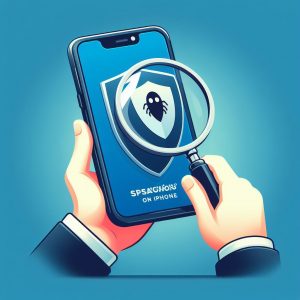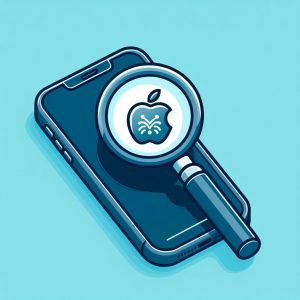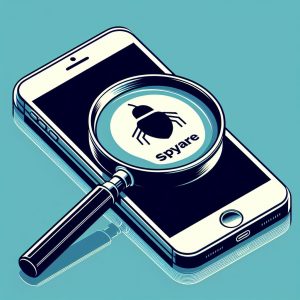I. Introduction
Spyware on smartphones is becoming increasingly common, with cybersecurity firm Norton reporting that mobile spyware attacks went up by 50% in 2021 alone. iPhones are no exception, and learning how to detect and remove spyware from your device is critical. Though iPhones have robust security measures in place, spyware can still find its way onto your phone through exploits in apps, websites, or even physical access to your device. Once installed, spyware can monitor your calls, messages, location, camera and more – all without your knowledge.
Detecting iPhone spyware quickly is important to prevent privacy violations and further exploitation. This guide will cover signs of spyware infection, how to thoroughly check for spyware on your iPhone, what to do if spyware is found, and additional measures you can take to improve security. Read on to learn how to find and eliminate spyware from your Apple device.

II. Signs of Spyware
The first signs that spyware has infected an iPhone can be subtle. Some of the most common clues include:
- Battery and Performance Issues: Spyware runs continuously in the background, draining your battery faster than normal. You may also notice lag, freezing, and general performance drops.
- Data Usage Spikes: The spyware sends your private data to outside servers. This increases cellular data usage well beyond what you’d expect from your normal iPhone activities.
- Unknown Calls and Messages: Spyware can secretly place calls, send texts, and share your info without permission. Watch for unusual outgoing activity.
Pay attention to these red flags, but know that advanced spyware can avoid detection. To thoroughly check for infections, you’ll need to conduct some additional inspection on your iPhone.
III. How to Check for Spyware
Finding spyware on an iPhone takes somemanual investigation, but following these steps can uncover stealthy infections:
- Reboot Your iPhone: Powering down and restarting your phone will temporarily disrupt spyware activity. This can bring performance issues, high data usage, and other unusual behavior to light.
- Check for Jailbreak: Jailbreaking removes iPhone security measures, allowing spyware to infect your device more easily. Go to Settings > General > About to see if your iPhone says it’s jailbroken under the software version.
- Do a Factory Reset: Backup your data and then erase your iPhone entirely by going to Settings > General > Reset > Erase All Content and Settings. If the issues go away, spyware was likely present. Just be sure to fully update and change all passwords before restoring your data.
- Review Installed Apps: Unfamiliar apps you don’t remember downloading could be spyware. Check Settings > General > iPhone Storage for a list of installed apps and delete anything suspicious.
- Check App Permissions: Spyware often needs certain permissions to function, like access to contacts, camera and location. Go through your apps and remove any unnecessary permissions.
- Run Antivirus Software: Advanced mobile antivirus software like Norton 360 can scan for spyware and malware on your iPhone. This should detect more stealthy infections.
Continually monitoring your iPhone for odd behavior and conducting periodic spyware checks is important for identifying issues early. If you do detect potential infections, quick action is necessary.

IV. What to Do if Spyware is Detected
If your inspection uncovers clear signs of a spyware infection on your iPhone, swift steps are needed to secure your device:
- Change Passwords: Update passwords for all sensitive accounts, including email, social media, banking, shopping sites and any others that store private information. Use strong, unique passwords for each.
- Remove Unknown Apps and Contacts: Delete any suspicious apps, phone numbers, email addresses and social media contacts. These could be tied to spyware monitoring your activity.
- Contact Apple Support: Apple may have additional support steps if they can detect spyware on your device. They can also help secure your iCloud account if it was compromised.
- Reset Your iPhone: Back up your data and then conduct an erase all content and settings reset to fully remove spyware infections. Avoid restoring from old backups which could reintroduce spyware. Set up your device as new before restoring just your personal data.
Stay vigilant even after clearing spyware from your iPhone. Ongoing monitoring with antivirus software and cautious security habits are the best way to defend against repeat attacks.

V. Additional Security Measures
Since iPhone spyware has become so advanced, additional security best practices are critical:
- Develop Strong Cybersecurity Habits: Don’t click suspicious links, never download from unofficial sources, use a VPN when on public WiFi, set all accounts to use two-factor authentication, and continually update devices and apps.
- Understand Advanced Spyware Risks: Powerful cyber weapons like Pegasus can break into iPhones by simply calling the device via WhatsApp. Keep software updated and avoid clicking unverified links to reduce this threat vector.
- Utilize Advanced Security Options: Apple offers monitoring capabilities to alert you of unauthorized account access and suspicious iPhone activity. Enable these features and routinely check security logs.
Evolving your security knowledge and implementing additional safeguards is key to protecting yourself from sophisticated iPhone spyware threats targeting individuals and businesses today.
VI. Conclusion
Spyware targeting iPhones continues to grow more advanced, making detection complex but still possible with consistent monitoring. Watch for unusual iPhone behavior like battery drain, sluggish performance, and unexplained cellular data spikes. Thoroughly check your device for spyware infections through rebooting, jailbreak detection, factory resets, and using antivirus software. If infections are uncovered, change passwords, delete suspicious apps and contacts, work with Apple support, and erase then fully resets your iPhone. Lastly, evolve your security posture through improved personal cybersecurity habits and Apple’s advanced security features. Staying vigilant protects your privacy and blocks cybercriminals from exploiting your sensitive data.